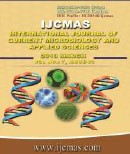


 National Academy of Agricultural Sciences (NAAS)
National Academy of Agricultural Sciences (NAAS)

|
PRINT ISSN : 2319-7692
Online ISSN : 2319-7706 Issues : 12 per year Publisher : Excellent Publishers Email : editorijcmas@gmail.com / submit@ijcmas.com Editor-in-chief: Dr.M.Prakash Index Copernicus ICV 2018: 95.39 NAAS RATING 2020: 5.38 |
Plants synthesize secondary metabolites and some of them as well as their derivatives have antimicrobial activity such as alkaloids, flavonoids, isoflavonoids, tannins, coumarins, glucosides, terpenes and phenolic compounds. An attempt was made to evaluate the in vitro antifungal and biofumigant nature of ten different plants on suppression of mycelial growth of R. solani. Among these plant extracts at a concentration of 12.5%, total inhibition of the pathogen was obtained on PDA incorporated with leaf extracts of cabbage and garlic creeper. The extracts of leaves of sweet potato (37.44%) and radish (30.00%) also gave significant suppression. Under in vitro evaluation of the biofumigant nature of plants, complete suppression of the pathogen was obtained on treatment with cabbage, cassava, garlic creeper and mustard. This was followed by radish, moringa, neem and lemon grass which gave suppression of 87.80%, 83.30%, 77.80% and 76.67%, respectively. Among the plants, cabbage, garlic creeper and mustard were found to be very effective biofumigants and caused 100% suppression on mycelial regeneration from sclerotia 24 h after exposure to the treatment. After a period of two weeks of biofumigation with cassava 100% suppression on sclerotial growth was noticed. Biofumigation with leaves of other plants such as sweet potato, moringa, papaya, neem and lemongrass, which are widely grown in the state afforded suppression of 81.85, 81.11, 79.63, 77.04 and 76.67%, respectively one month after exposure to the treatment. In general, biofumigation with plants exerted suppression of mycelial regeneration from sclerotia. The extent of suppression was found to increase with increase in period of incubation with biofumigants.
 |
 |
 |
 |
 |